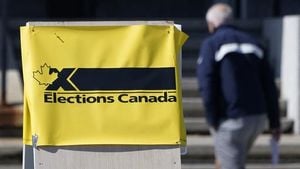The Trump administration may make headlines again as it considers canceling the major contracts signed by the United States Postal Service (USPS) to build up its electric vehicle fleet. This move, which aligns with Trump's long-standing skepticism of environmental policies, could reverse the USPS's plans to purchase approximately 66,000 new electric trucks and invest heavily in EV charging infrastructure. Sources familiar with the situation have noted the significant financial stakes involved, as the contracts represent billions of dollars earmarked for modernization efforts aimed at reducing fuel costs and emissions.
The USPS, facing mounting pressures from both environmental groups and the general public seeking greener alternatives, previously announced these ambitious plans under the Biden administration. The electric vehicle initiative was hailed by supporters as pivotal for the future of postal services, as it would promise cleaner air and substantial reductions in the carbon footprint associated with mail delivery. The USPS had planned to leverage these new vehicles to replace its aging fleet, much of which has been operating for decades.
According to insiders, the potential cancellation of these contracts could stem from broader discussions on relaxing environmental regulations. The Trump administration appears poised to push for sweeping executive orders aimed at rolling back multiple vehicle efficiency standards and incentives established by the Biden administration.
Interestingly, the influence of Trump's transition team—made up of key advisers known for their focus on traditional energy methods and policies rather than renewable resources—could play a significant role. These advisers have evidently communicated ambitions to cancel contracts related to not just USPS initiatives but also undercut various EV tax incentives proposed by the Biden administration, which could impact the future of the electric vehicle market at large.
Many experts are sounding alarms over the repercussions of such actions. A cancellation of these contracts might not just stifle the shift to electric vehicles and green technology but could move the country backward as it tackles climate change. There’s also the risk of damaging the USPS's credibility and its relationship with environmental organizations, which had found hope in its shift toward electric vehicles. The organization's attempts to reduce its environmental impact would effectively be tossed aside as the Trump administration moves toward its nonchalant approach to climate issues.
Alternative dissenters argue passionately against canceling the initiative. Some postal workers assert their preference for the electric vehicles, citing lower maintenance costs and improved work conditions due to reducing exposure to harmful emissions. Hence, both sides are gearing up for what could be another battle over environmental policy, energy usage, and modernization efforts as the country remains sharply divided on these issues.
With the issue now on the table, it remains to be seen how Congress will react. Lawmakers from both parties have historically supported investing in cleaner technologies; yet, the intricacies of negotiations during this administration may heavily influence decision-making processes, particularly as they affect federal spending.
The Biden administration has yet to comment officially on the situation, and many feel an urgent need for clarity. Public advocates and stakeholders are increasingly anxious as heavy discussions loom on the future of USPS's electrification project. Meanwhile, financial analysts speculate on potential stock market reactions should these cancellations become official, indicating widespread concern around future trends for clean energy involved businesses.
Wsuch discussions on sustainability could inevitably intertwine with the broader topic of how governmental bodies are handling substantial infrastructure transformations and climate commitments. The impending cancellation of electric vehicle contracts could detect major shifts not just for USPS but also reflect on the industry's overall direction concerning federal support for sustainability and renewable energy projects.
With presidential elections looming on the horizon, debates surrounding environmental policies and electric vehicles will likely continue to be front and center. The outcome of these discussions may influence not just USPS but the entire transportation sector's transition toward greener alternatives, making it one of many pivotal moments leading up to the next election.
Hope remains, though, for advocates wanting to keep the USPS electric vehicle initiative afloat. The coming weeks should offer greater insight and reveal the sustainability or the obliteration of electric vehicle ambitions as new policies emerge from the executive office.



